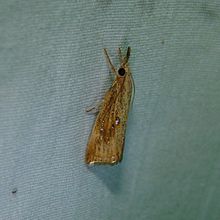- Chilo plejadellus
-
Chilo plejadellus 
Scientific classification Kingdom: Animalia Phylum: Arthropoda Class: Insecta Order: Lepidoptera Family: Crambidae Genus: Chilo Species: C. plejadellus Binomial name Chilo plejadellus
Zincken, 1821[1]Synonyms - Chilo oryzaeellus C. V. Riley, 1882
- Chilo oryzeellus Munroe, 1995
- Diphryx prolatella Grote, 1881
- Jartheza sabulifera Walker, 1863
The Rice Stalk Borer Moth (Chilo plejadellus) is a moth in the Crambidae family. It is found in North America, including Illinois[2], Ontario, Quebec, Pennsylvania, Georgia, Louisiana, Wisconsin[3], Texas and Arkansas.
The wingspan is 20-40 mm. The forewings are white or pale brown with black scales. Forewing edges have a row of metallic gold scales and black dots. The hindwings are white or pale brown.
The larvae are a minor pest of rice. Early instars enter the rice plant stem by chewing a hole either behind the leaf sheath or near the base of the panicle. Several larvae enter the stem from a single hole. They initially feed on the inner stem tissues but eat into the lower larger part of the stem. Later instars keep feeding on tissue until only a single thin layer of tissue covers a circular hole in the stem above the water line. They overwinter in a rice stubble. Pupation occurs in the spring and adults emerge in May. The larvae are light brown with one dark brown and one light brown stripe along each side of the body. They reach a length of 25-40 mm.[4]
References
- ^ "mothphotographersgroup". Mothphotographersgroup.msstate.edu. http://mothphotographersgroup.msstate.edu/species.php?hodges=5470. Retrieved 2011-10-13.
- ^ "Bug Guide". Bug Guide. http://bugguide.net/node/view/12266. Retrieved 2011-10-13.
- ^ "Chilo at funet". Nic.funet.fi. http://www.nic.funet.fi/pub/sci/bio/life/insecta/lepidoptera/ditrysia/pyraloidea/crambidae/crambinae/chilo/index.html. Retrieved 2011-10-13.
- ^ "Insect Management - Rice Insect Management - Rice Stalk Borer". Aragriculture.org. http://www.aragriculture.org/insects/rice/rice_stalk_borer.htm. Retrieved 2011-10-13.

This Spilomelinae-related article is a stub. You can help Wikipedia by expanding it.
